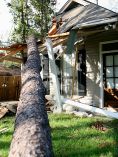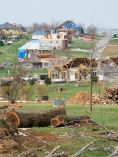Tips for a Power Outage: Don't Be Left in the Dark

During severe weather, power lines are often one of the first things affected, which can leave your family and possibly your whole neighborhood in the dark. In most cases, you will only be without power for a few hours, but if entire sections of a city are affected, it can take a long time to restore power. Power companies will work diligently around the clock to keep your down time at a minimum, but in the meantime it can be inconvenient. Here are some ways you can make your down time more bearable.
Before the Storm
Ice storms, blizzards, hurricanes or severe thunderstorms are all weather culprits that can cause power outages. While most of these outages are brief, some can last several days or longer. Some storms are predicted in enough time that you can make plans to evacuate, then return when power is restored.
- If evacuating is not an option, use your time to stock up on necessities like flashlights, batteries, candles, matches or lighters, charcoal or propane for your grill, bottled water and non-perishable foods.
- Fill up the gas tank in all your vehicles. If power is out in your city, you might have to go out, or you might still decide to evacuate. If gas stations have no power, you can't get gas.
- Go to the ATM. You will need cash because as stores begin to open, their credit card machines may not be working right away.
- Empty your refrigerator and place as many items as possible in coolers, pour ice on top, then put the coolers in the refrigerator. You will probably need to remove your refrigerator's shelves to make this work, but your food will stay cold much longer.
- Do your laundry. If you are without power for a week, you might be surprised at how quickly you can run out of clean clothes.
- Charge all cell phones and tablets before the storm hits so you can still get news alerts and keep in touch with people.
- Put your cars in the garage. If you don't have enough garage space, take extra vehicles to a public garage. A high parking garage fee is better than making a comprehensive claim on your vehicle.
After the Storm
If you are without power for a prolonged period of time and you stocked up on supplies for just such an event, there are still things you need to know:
- Use flashlights, candles and anything battery-operated sparingly. You can run out of batteries and matches quickly, and if stores don't have power, they will be closed, making it difficult to get more.
- If you want to grill any meat you have in the freezer before it spoils, get in and out of the refrigerator or freezer as quickly as possible. A full freezer should maintain its temperature for up to 48 hours if you keep the door closed.
- If water treatment plants don't have power, the water coming from your faucet may not be safe to drink. That's why it's important to have plenty of bottled water on hand.
Once power is restored, check the temperature of any remaining food in your refrigerator. If the temperature is 40° or lower, it is safe to keep. Otherwise, throw it away to keep yourself and your family from getting sick. Also, check your water. If it's cloudy, it may not be safe to cook with or drink. You may need to boil it first to kill any organisms, then filter it though a cheesecloth.
A massive power loss is rare, but don't ignore storm warnings! Having a plan and an emergency kit ready can make all the difference in the world.
-
After a Storm
 What to Do
What to DoIf a storm causes damage to your property, it can be hard to know what to do. Read this before a storm hits—you might be surprised!
-
After a Catastrophic Storm
 What to Expect
What to ExpectA bad storm that causes some damage to your property is disconcerting enough, but a catastrophic storm that destroys it is worse. This might help ease your mind.
-
Storm Claims Process
 What Now?
What Now?A disaster like a tornado, widespread hail or hurricane may mean a lot of people are making claims. Here’s what you can expect from the claims process.
